2013 – 2014
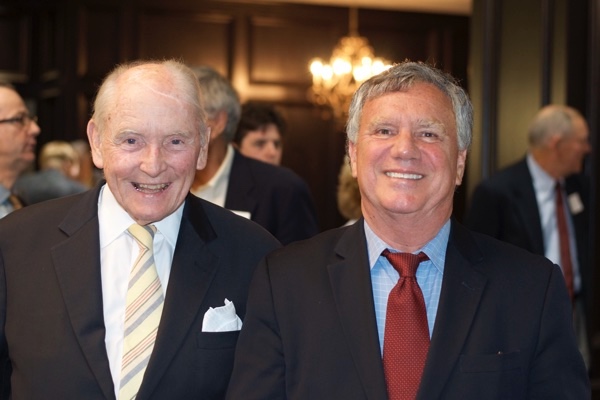
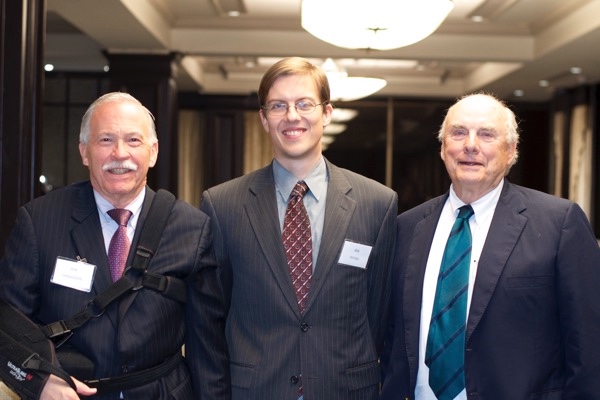
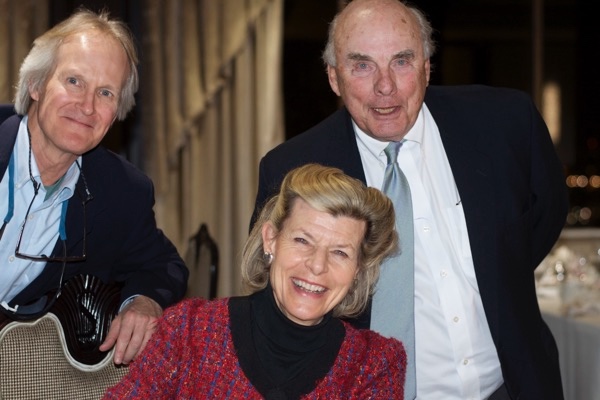
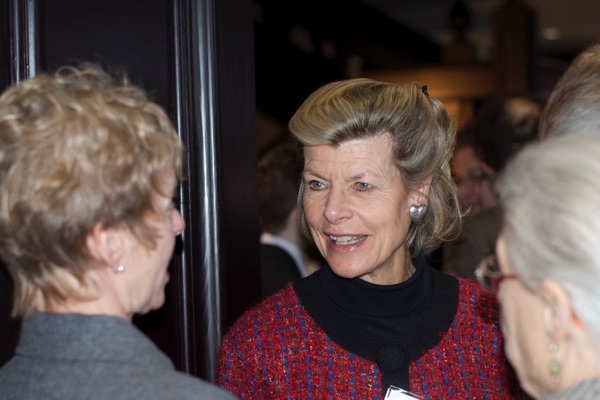
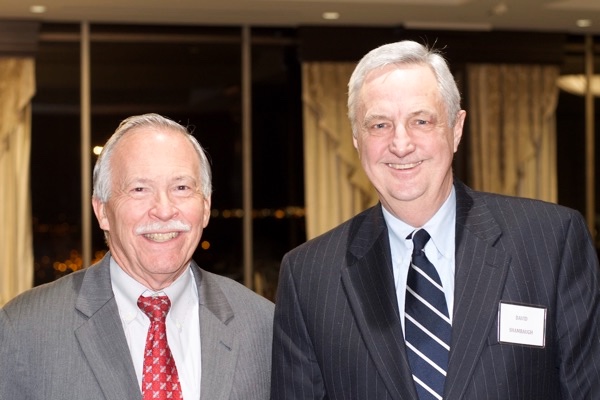

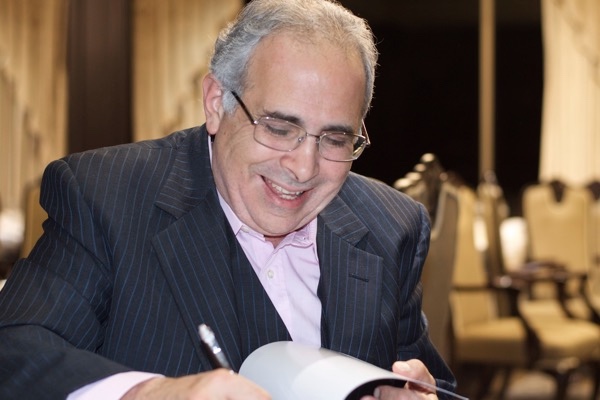


Barbara Slavin, Senior Fellow, Atlantic Council
“Iran Gets a New President, But Will it Make a Difference?”
Barbara Slavin is a senior fellow at the Atlantic Council’s South Asia Center and Washington correspondent for Al-Monitor.com, a website devoted to news from and about the Middle East. The author of a 2007 book, Bitter Friends, Bosom Enemies: Iran, the US and the Twisted Path to Confrontation, she is a regular commentator on U.S. foreign policy and Iran on NPR, PBS and C-SPAN.
A career journalist, Slavin previously served as assistant managing editor for world and national security of The Washington Times, senior diplomatic reporter for USA TODAY, Cairo correspondent for The Economist and as an editor at The New York Times Week in Review.
She has covered such key foreign policy issues as the US-led war on terrorism and in Iraq, policy toward “rogue” states, the Iran-Iraq war, and the Arab-Israeli conflict. She has traveled to Iran nine times, most recently to cover the inauguration of Iranian President Hassan Rouhani. Slavin also served as a public policy scholar at the Woodrow Wilson International Center for Scholars, where she wrote Bitter Friends, and as a senior fellow at the US Institute of Peace, where she researched and wrote the report Mullahs, Money and Militias: How Iran Exerts Its Influence in the Middle East.
Janet Bogue, former Deputy Assistant Secretary of State
“Diplo-Mapping: The Maps Diplomats Draw and their Consequences”
Janet Bogue completed her career in the United States Foreign Service in 2005. She was Deputy Assistant Secretary of State for Europe and Eurasia, responsible for U.S. Balkans policy and the work of seven American diplomatic missions during the armed conflict in Macedonia and the period after 9/11. Other assignments during a twenty-four year career included: Chargé d’Affaires, Kathmandu; Deputy Chief of Mission, Kathmandu; Deputy Chief of Mission, Almaty; Speechwriter for Secretary Warren Christopher; Senior Desk Officer for the former Yugoslavia; Political Officer for Afghanistan, based in Islamabad; Delegate to the Negotiations on Conventional Forces in Europe, Vienna; and Political Officer, Belgrade. Ms. Bogue was also Director of Assignments and Career Development for new Foreign Service employees.
Ms. Bogue’s diplomatic honors include the State Department’s Meritorious Honor and Superior Honor Awards, and the Secretary of State’s Career Achievement Award. For their 1993 dissent on U.S. policy toward Bosnia, Ms. Bogue and colleagues received the American Foreign Service Association’s William R. Rivkin Award for Intellectual Courage and Constructive Dissent. She and a team in Kazakstan earned the State Department’s Award for Valor for efforts to end nuclear, biological and chemical weapons programs there.
Ms. Bogue has devoted herself to teaching since leaving the State Department. She taught undergraduates in the Government Department at Skidmore College and advised graduate students as a career coach at the Elliott School of International Affairs at The George Washington University. She is a frequent speaker on leadership, ethics and dissent at the Foreign Service Institute in Virginia, and a lecturer for lifelong-learning programs, including Road Scholar’s programs at The Chautauqua Institution in New York. For several years, she has taught nature-based science programs and environmental education to K-6 students. A photographer of American landscapes, she has also taught photography to students in middle school and high school.
Ms. Bogue earned a BA summa cum laude in history at the University of Puget Sound, which later made her an honorary Doctor of Laws for her contributions to American diplomacy. Ms. Bogue holds a Master of Arts in history from the University of Oregon. She speaks German, Russian, and Serbian.
John Zogby, founder of the Zogby Poll
“First Globals: Understanding, Managing and Unleashing our Millennial Generation”
John Zogby, founder of the “Zogby Poll” and the Zogby companies, is an internationally respected pollster, opinion leader and best-selling author.
“All hail Zogby, the maverick predictor,” decreed The Washington Post, when John Zogby called the 1996 presidential election with pinpoint accuracy. And he did it again in the following two elections. His presidential polling remains among the most accurate through five elections. He has served as an on-air election analyst for NBC News, BBC, CBC, ABC (Australia), and has been featured by the Foreign Press Center in Washington every election night since 1998.
The Zogby Poll, the “second best known polling brand in the US today” (Washington Post), John Zogby remains the hottest and most accurate pollster and analyst of America’s political and cultural landscape. In addition to the global reach of his brand, Zogby Polls have been cited frequently in popular culture, including NBC’s West Wing, CW’s Gossip Girls, Netflix movie House of Cards, and numerous novels, game shows, and the 25th Anniversary edition of Trivial Pursuit. Zogby Polls are regularly cited on The Tonight Show and spoofed on The Late Show and NPR’s All Things Considered. Fortune Magazine, The New Yorker and Investor’s Business Daily have all profiled John Zogby. He has appeared on every major U.S. television network, the BBC and scores of U.S. broadcasts. His appearances on The Daily Show with Jon Stewart are among his favorites.
Called “The Prince of Polling” by political strategist Mary Matalin, John Zogby’s interactive methodology is a leader in the industry. He is the author of the best-selling The Way We’ll Be: The Zogby Report on the Transformation of the American Dream (Random House, 2008) and is co-author of the new book, First Globals: Understanding, Managing, and Unleashing Our Millennial Generation (with Joan Snyder Kuhl).
Zogby writes weekly columns on Forbes.com and contributes a weekly Obama report card to The Washington Examiner’s Washington Secrets, by Paul Bedard. He is also a founding contributor to The Huffington Post. His analytical expertise has also been published on the opinion pages of the New York Times, Wall Street Journal and Financial Times. A well known political and social pundit, his work has been featured in op-ed pages worldwide, valued in corporate boardrooms and considered “must-read” at every level of America’s political landscape.
A senior advisor at the Kennedy School of Government at Harvard University, Zogby also serves as a Commissioner for the Center for Strategic and International Studies (CSIS) Commission on Smart Power and is a senior fellow of the Catholic University Institute for Policy Research and Catholic Studies. As Chairman of Sudan Sunrise, Zogby works to continue the vision of NBA player Manute Bol to bring peace to Sudan through education. He is presently chairman of the capital campaign on behalf of Mohawk Valley Community College (where he taught in the 1970s), and serves on the boards of the Arab American Institute, Upstate Venture Connect (which links young entrepreneurs with venture capital in Upstate New York), and Freedom Guide Dogs.
Zogby has been awarded three honorary doctorates from the State University of New York, the College of St. Rose, and the Graduate School of Union University. In 2008 he was awarded the Chancellor’s Distinguished Fellows Award from the University of California Irvine.
Robert H. Donaldson, Trustees Professor Emeritus of Political Science University of Tulsa
“Putin’s Return: What Does it Mean for Russia–and for the U.S.?”
Robert H. Donaldson is Trustees Professor Emeritus of Political Science at the University of Tulsa, where he served as President from 1990-96. Previously (1984-90) Dr. Donaldson was President of Fairleigh Dickinson University, New Jersey’s largest private university, and Provost of Lehman College of the City University of New York (1981-84). He has also taught at Vanderbilt University and at Harvard University; the latter institution awarded his B.A., M.A. and Ph.D. degrees in political science.
Dr. Donaldson has authored or co-authored six books and monographs and more than two dozen articles and book chapters, mostly on the politics and foreign policy of the Soviet Union and Russia. His latest book, with Joseph Nogee and Vidya Nadkarni, is The Foreign Policy of Russia: Changing Systems, Enduring Interests; the fifth edition was published in March 2014 by M.E. Sharpe, Inc.
Dr. Donaldson has lectured widely and has served as a consultant to several government agencies. In 1973-74 he was a Council on Foreign Relations International Affairs Fellow serving as a consultant to the Department of State, and in 1978-79 he was Visiting Research Professor at the Strategic Studies Institute of the U.S. Army War College. In recent years, he has made numerous trips to Russia, where he helped establish programs in which the University of Tulsa participated, including the Zelenograd Business College, the Russian-American Oil and Gas Technology Center, and the Russian-American Management Program. More recently, he has worked as a senior consultant with Kaludis Consulting, Inc., on strategic planning and leadership development with universities in Saudi Arabia.
A member of the Council on Foreign Relations, Dr. Donaldson is a past president of the American Committees on Foreign Relations. He has been honored for his work in international higher education by an honorary doctorate awarded by Kyungnam University in Korea, and by the Order of Andres Bello, presented in 1991 by President Carlos Andres Perez of Venezuela.
David Shambaugh, Professor of Political Science and Internationa Affairs, George Washington University
“China Goes Global: The Partial Power”
Professor Shambaugh is an internationally recognized authority and author on contemporary China and the international relations of Asia, with a strong interest in the European Union and transatlantic issues.
Before joining the faculty at George Washington, he held the positions of Reader in Chinese Politics at the University of London’s School of Oriental & African Studies (SOAS) and Editor of The China Quarterly. He also previously served as an analyst on the staff of the National Security Council East Asia Bureau and the Department of State’s Bureau of Intelligence & Research (1976-78). He is also been a nonresident Senior Fellow in the Foreign Policy Studies Program and Center for Northeast Asian Policy Studies at The Brookings Institution since 1998, and previously directed the Asia Program at the Woodrow Wilson International Center for Scholars (1986-87). He currently serves on the Board of Directors of the National Committee on U.S.-China Relations, and has been elected a member of the International Institute for Strategic Studies, Council on Foreign Relations, U.S. Asia-Pacific Council, and other public policy and scholarly organizations. He is a recipient of research grants from the Ford Foundation, Rockefeller Foundation, Smith Richardson Foundation, German Marshall Fund, British Academy, U.S. National Academy of Sciences, and other philanthropic bodies. He has been appointed a Fellow at the Woodrow Wilson International Center for Scholars (2002-03), an Honorary Research Professor at the Shanghai Academy of Social Sciences (2008–), and a Senior Fulbright Research Scholar at the Chinese Academy of Social Sciences Institute of World Economics & Politics in Beijing (2009-10). Professor Shambaugh has also been a visiting scholar or professor at universities in Australia, China, Hong Kong, Italy, India, Japan, Singapore, Russia, and Taiwan. He is also a frequent contributor to the international media, serves on a number of editorial boards, and has been a consultant to various governments, research institutions, foundations, and private corporations.
He received his B.A. in East Asian Studies from the Elliott School of International Affairs at George Washington University, M.A. in International Affairs from Johns Hopkins University Nitze School of Advanced International Studies (SAIS), and Ph.D. in Political Science from the University of Michigan.
Professor Shambaugh received his Ph.D. in Political Science from the University of Michigan, an M.A. in International Affairs from Johns Hopkins University Paul H. Nitze School of International Studies (SAIS), and B.A. in East Asian Studies from the Elliott School of International Affairs at George Washington University. He also studied at Nankai University, Fudan University, and Peking University in China.
Publications
- China Goes Global: The Partial Power (Oxford University Press, 2013)
- Tangled Titans: The United States and China (Rowman & Littlefield, 2012)
- Charting China’s Future (Routelledge, 2011)
- China’s Communist Parrty: Atrophy & Adaptation (University of California Press, 2008)
- International Relations of Asia (Rowman & Littlefield, 2008)
- China-Europe Relations: Perceptions, Policies and Prospects (Routledge, 2007)
- Power Shift: China & Asia’s New Dynamics (U Cal. Pr., 2006)
- China Watching: Perspectives from Europe, Japan, and the United States (Routledge, 2006)
- The Odyssey of China’s Imperial Art Treasures (University of Washington Press, 2005)
- Modernizing China’s Military (University of California Press, 2003)
- The Modern Chinese State (Cambridge University Press, 2000)
Professor Shambaugh is a frequent commentator in international media, and has contributed to leading scholarly journals such as International Security, Foreign Affairs, The China Quarterly, and The China Journal.
Andrea Mazzarino, Human Rights Watch
“Disability Rights Activism in Russia: A Case Study of Government-Civil Society Relations”
Andrea Mazzarino, an anthropologist specializing in contemporary Russia, is currently a Fellow at the Europe and Central Asia Division of Human Rights Watch. There she has researched and written various reports on human rights abuses. She is author of a new report on accessibility for people with disabilities in Russia, analyzing access to education, healthcare, and the physical environment.
Previously, Dr. Mazzarino was Director of the Costs of War Project at the Watson Institute for International Studies of Brown University. She recruited, coordinated and publicized the findings of an interdisciplinary team researching the human, economic, and political costs of America’s post-9/11 wars. As a Research Fellow for the Ruth Landes Memorial Research Fund, she researched and published academic articles on gender discrimination in the workforce and on the economic and political status of Russian women.
A 2010 recipient of a Ph.D. in Cultural Anthropology from Brown University and 2001 B.A. graduate of Duke University, she is fluent in Russian and has carried out dozens of interviews with survivors of human rights violations, government officials, and local activists in cities throughout Russia.
Diana Villiers Negroponte, Non-Resident Senior Fellow, The Brookings Institution
“How Are Brazil and Mexico Confronting the Challenges of Globalization?”
Diana Negroponte is a nonresident senior fellow with the Latin America Initiative under the Foreign Policy program at Brookings. Her work is devoted to research and writing on Latin America, with particular emphasis on security issues in Mexico and Central America. Previously she was a senior scholar at the U.S. Institute of Peace. She received her doctorate from Georgetown University with a dissertation that examined efforts to make peace at the end of the Cold War in El Salvador.
Before coming to Brookings, Dr. Negroponte practiced law with Paul, Hastings, Janofsky & Walker, specializing in international trade and aviation matters. She also played an active role with the U.S. Chamber of Commerce in Mexico during the negotiations for the North American Free Trade Agreement. She continues her legal interests with her current research and writing on judicial and police reform in Latin America.
Diana Negroponte has spent a lifetime devoted to social and development issues, particularly in the developing world. In Uganda, she taught blind children mathematics and music. In Honduras, she worked actively with refugees, displaced by the civil wars in two neighboring countries, as well as the teaching of illiterate adults and the provision of medicines for children with cancer. In Mexico, she built low income homes in city slums with Habitat for Humanity International and initiated a program for the artistic development of people with disabilities, Very Special Arts in Mexico. In the Philippines, she dedicated time to micro-credit programs throughout the country, as well as building homes with Habitat for Humanity.
She has remained involved in the area of social development, serving on the boards or advisory councils of various U.S. non-profit organizations dedicated to these causes.
She has recently published The End of Nostalgia: Mexico Confronts the Challenges of Global Competition. She has also published numerous articles and publication on the region, including Seeking Peace in El Salvador: The Struggle to Reconstruct a Nation at the End of the Cold War (2012) and The Merida Initiative & Central America: The Challenges of Containing Public Insecurity and Criminal Violence (2009).
Benjamin Peters, Department of Communication, University of Tulsa
R. Dobie Langenkamp, Consultant, former Deputy Assistant Secretary of Energy
Robert H. Donaldson, Professor Emeritus, University of Tulsa
“Crisis in Ukraine”
Dr. Peters writes, teaches, and talks publicly on media. He is a researcher and teacher,
mentor and adviser interested in wide range of intellectual, institutional, and strategic
issues related to media technologies and innovation. His focus is on new media and
digital media. Regional emphases: Russia, Ukraine, Germany, Israel, among others.
Specialties: New and digital media, media history and theory, global communication
technologies, cultural studies and criticism, Eastern Europe, Europe area studies.
He has a bachelor’s degree from Brigham Young University, a Master’s degree from Stanford,
and a Ph.D. from Columbia University.
Dobie Langenkamp
EDUCATION
Harvard Law School – JD – 1961
Stanford University – BA – 1958, mcl, Phi Beta Kappa
BUSINESS AND PROFESSIONAL AFFILIATIONS
2000-2006: Professor of Law and Director, National Energy-Environment Law and Policy Institute, University of Tulsa College of Law
1997-2000: Attorney at Law and Consultant for USAID (consulting in Kazakhstan and Georgia); Owner – Petroleum Associates International, Consultants
1996-1997: Deputy Assistant Secretary for Naval Petroleum Reserves and Divestment – U.S. Dept. of Energy, Washington, D.C.
1991-1996: President and owner of Cherokee Operating Company (oil and gas exploration); Attorney at Law
1989-1991: Chapman Distinguished Visiting Professor of Law – University of Tulsa School of Law; Deputy Director, National Energy Law and Policy Institute (NELPI)
1981-1989: Attorney at Law and owner of Cherokee Operating Company (oil and gas exploration); Adjunct Professor of Law, Tulsa University Law School; Senior Fellow – “Law and Society” Program, Tulsa University College of Arts and Sciences
1977-1981: Deputy Assistant Secretary for Oil, Natural Gas and Oil Shale – U. S. Dept. of Energy, Washington, D.C.
1964-1977: Partner in law firm of Doerner, Stuart, Saunders, Daniel and Langenkamp, Tulsa, Oklahoma
1962-1964: Attorney with Steadman, Collier and Shannon, Washington, D.C.
HONORS
Susan J. Ferrell Memorial Distinguished Career in Public Policy Award – The University of Tulsa College of Law, 2001
Patriotism in Energy Award – International Society of Energy Advocates, 1998
Naval Petroleum Reserves Appreciation Award, 1997
Outstanding Performance Medal – U.S. Department of Energy, 1980
Exceptional Service Award – U.S. Department of Energy, 1979
Outstanding Young Lawyer – Tulsa County Bar Association, 1970
CIVIC ACTIVITIES
Oklahoma Nature Conservancy – Trustee, 2001 to present
Oklahoma Ordnance Works Authority – Trustee, 1998-2002; Chairman 2002 to present
University Center at Tulsa – Trustee and Regent, 1992-96; Chairman 1992-93
Rogers University – Regent, 1996-98
Oklahoma School of Science and Mathematics – Trustee, 1994-1999
See Dr. Donaldson’s bio above.
Charlotte (“Charlie”) Ponticelli, ACFR Program Director
“The Status of Women’s Rights in Afghanistan”
Charlotte M. (Charlie) Ponticelli is an international consultant and adjunct professor at the Catholic University of America. Charlie has 23 years of US Government experience, serving most recently as Deputy Under Secretary for International Labor Affairs at the U.S. Department of Labor and Senior Coordinator for International Women’s Issues at the US Department of State.
Previously she also served as Senior Advisor for State’s Bureau of Population, Refugees, and Migration; Director of Human Rights in State’s Bureau for International Organization Affairs; Congressional Liaison for Latin America and the Caribbean at the U.S. Agency for International Development; and Director of Congressional Correspondence in the Legislative Affairs Office of the White House.
Charlie is a member of several boards and organizations, including the Bayat Foundation, the Initiative to Educate Afghan Women, and the U.S.-Afghan Women’s Council. She is a founding partner of Disaster Logistics Relief, a humanitarian organization specializing in telemedicine and disaster-relief technologies.
She received her B.A. (Spanish Literature) from Hood College and her M.A. through New York University’s program in Madrid, Spain.
James Clad, Cambridge Energy Research Associates
“The World Politics of a Changing Energy Landscape”
James Clad consults for energy and investment firms, and is senior adviser at the Center for Naval Analyses and at Jane’s Defence and Cambridge Energy Research Associates (CERA). During 2002-10, he served as US deputy assistant secretary of defense for Asia, and as senior counselor at the Overseas Private Investment Corporation and the Agency for International Development. From 1995-2002 he held a Georgetown University Luce foundation professorship and was, concurrently, Director/Asia-Pacific Energy at CERA.
Trained as a New Zealand lawyer, his career has focused on Asian commercial and security affairs broadening after 2002 to include the Middle East. In the 1980s-90s, he wrote for the Far Eastern Economic Review, and had fellowships from St. Antony’s College, Oxford, from the Carnegie Endowment, and from Harvard’s Center for International Affairs. He also served in the New Zealand diplomatic service.
His first book, Business, Money & Power in Southeast Asia (1991), surveyed Asian capitalism while his next, After the Crusade (1996), critiqued US foreign policy. His most recent book is a volume on political geography, The Borderlands of Southeast Asia. He received the Secretary of Defense Exceptional Public Service Award in 2009 and, in June 2011, became a Member of the New Zealand Order of Merit, a royal honor. He is married to Aurora Medina, a World Bank official, and has three children.
